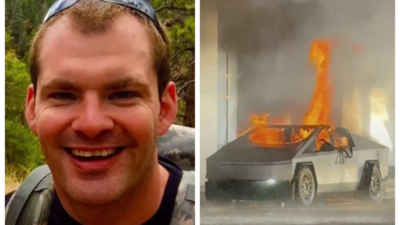The decorated Green Beret who died by suicide in a Tesla Cybertruck explosion on New Year’s Day in Las Vegas had confided to a former girlfriend about his struggles with pain and exhaustion after serving in Afghanistan. Matthew Livelsberger, 37, had an exemplary military career, earning five Bronze Stars, including one for valour under fire. However, his service left him grappling with the mental and physical toll of combat.
Livelsberger’s former girlfriend, Alicia Arritt, a former Army nurse, said he exhibited symptoms consistent with traumatic brain injury (TBI), a condition often linked to combat exposure. In messages shared with Arritt, he spoke of concussions, chronic pain, and sleepless nights haunted by memories of his deployment in Helmand Province, Afghanistan. “My life has been a personal hell for the last year,” he told her during the early days of their relationship in 2018.
Arritt recalled Livelsberger as a man of deep integrity, yet burdened by his experiences. He described reliving violent moments from his service and shared an image of a tattoo depicting skulls pierced by bullets, symbolising lives he had taken. Despite these struggles, he hesitated to seek help, fearing it might jeopardise his ability to deploy, a concern amplified by stigma in his Special Forces unit.
Investigators revealed that Livelsberger intentionally orchestrated the explosion near the Trump International Hotel to make a statement about societal issues. In notes found on his phone, he described the act as a “wake-up call” and a means to “cleanse the demons” from his past. He also criticised what he saw as America’s focus on spectacle and violence, writing, “What better way to get my point across than a stunt with fireworks and explosives?”
The explosion injured seven people but caused no fatalities. Authorities confirmed it was not an act of terrorism and that Livelsberger acted alone. His notes, which referenced political and societal issues, including the war in Ukraine, called for Americans to unite behind figures like Elon Musk and Donald Trump. Officials clarified that Livelsberger bore no ill will toward Trump, who was not in Las Vegas at the time.
Pentagon spokesperson Sabrina Singh encouraged troops experiencing mental health struggles to utilise available support networks.




